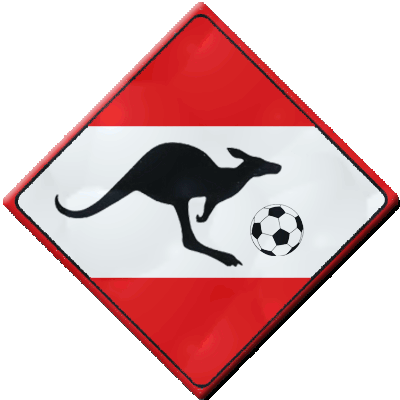 Austrian Kangaroos |
Team Contact: Institutes: |
| Team Profile: | The Austrian Kangaroos are a team of volunteers, consisting of undergraduates, graduates, and researchers from Vienna University of Technology and University of Applied Sciences Technikum Vienna. The Kangaroos participated in RoboCup for the first time in Graz, 2009. Since then numerous students run through our robotic based education gaining experience in research and development within a challenging but entertaining environment. Parts of our professional research activities have been disseminated into other domains like the automotive industry and the game engineering business. |
| Research Topics: | Biomimetics, safety and security, computational intelligence, computer vision |
| Team Report: | Research Report 2014 Whistle Detector |
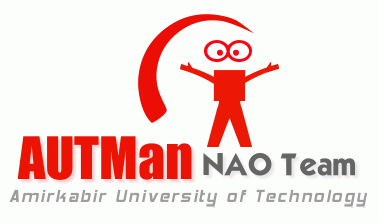 AUTMan |
Team Contact: Institutes: |
| Team Profile: | AUTMan NAO team is one of the active research groups which are working on Standard Platform robots at Humanoid Robotic Laboratory in Amirkabir Robotic Center of Amirkabir University of Technology (AUT). AUTMan team has formed to begin his project due to the basis of experience of Humanoid League which has been in progress since June 2010 and Soccer Simulation league which is active since 2004. AUTMan NAO Team consists of undergraduate and graduate students in the departments of Computer Engineering and Information Technology, Mechanical and Electrical Engineerings. |
| Research Topics: | Gait Generation, Computer Vision, Probabilistic State Estimation, Machine Learning, Multi-Robot Localization, Motion Behavior. |
| Team Report: | AUTMan2012-TDP.pdf |
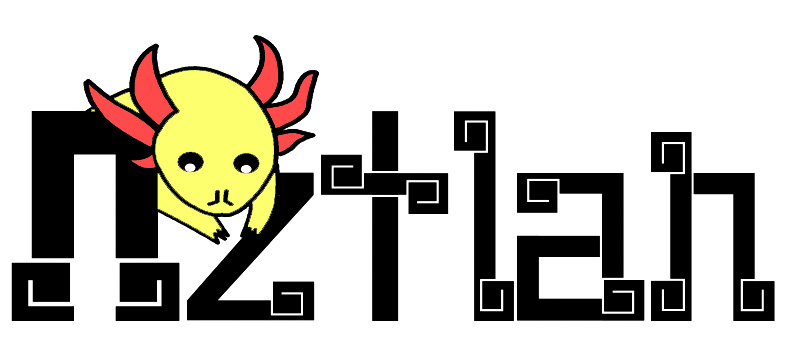 Aztlan |
Team Contact: Institutes: |
| Team Profile: | The Aztlan SPL team is a collaborative effort of the following Mexican institutions: UTM, ITAM, CIMAT, DEMAT-UG, CIC-IPN, UP, and INAOE. |
| Research Topics: | Motion Planing, Computer Vision, Localization, Gröbner basis. |
| Team Report: | Not Available |
 Bembelbots |
Team Contact: Institutes: |
| Team Profile: | The RoboCup team Bembelbots was founded in 2009 at the Goethe University Frankfurt (Main), Germany as a group fully organized by students. As there is no robotics group at the university, the team should help students to increase their experience in robotics, as well as programming skills in addition to the theoretical orientation of the computer science degree program of the university. For that reason, we started developing our own framework from scratch. Team Bembelbots has regularly competed in the RoboCup German Open since 2010 as well as the RoboCup Worldcups in 2012, 2013 & 2016-2019. |
| Research Topics: | Machine Learning, Localization, Behavior Modeling, Software architecture |
| Team Report: | 2019 Team Report |
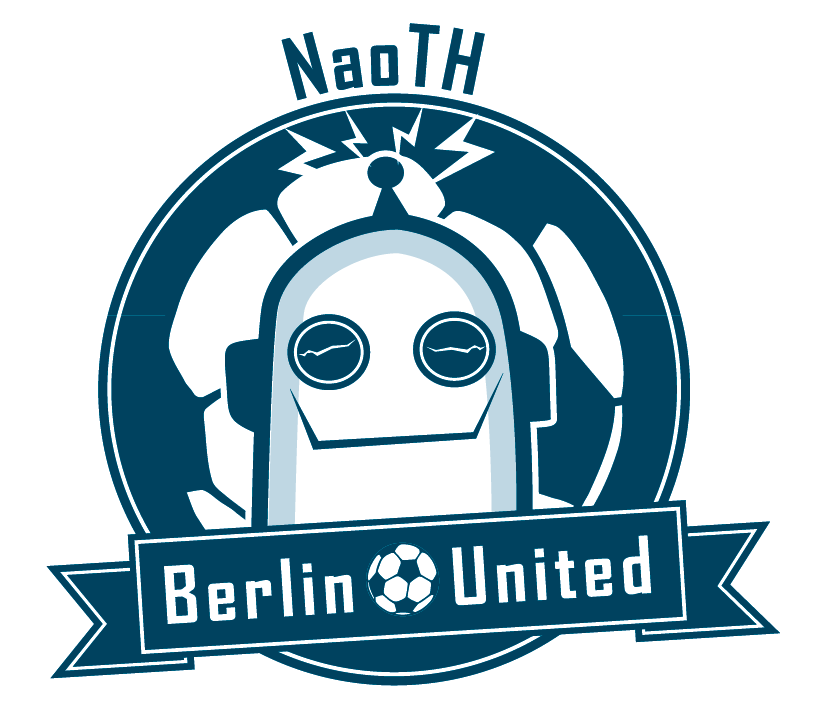 Berlin United – Nao Team Humboldt (BU-NaoTH) |
Team Contact: Institutes: |
| Team Profile: | “Berlin United”, formerly Nao Team Humboldt (NaoTH), is part of the Adaptive Systems group at the Humboldt-Universität zu Berlin. Our group has been involved in RoboCup since 1998 with various teams in different leagues. Berlin United was established in 2007 and is participating in SPL since the first competition of the league in 2008 in Suzhou/China. At the last RoboCup in Sydney in 2019 our team won the Technical challenge and the Mixed-Team competition as part of the mixed team “B&B” together with B-Human. At the current state the human part of the team consists of about 6 students of Bachelor, Master/Diploma, and PhD levels as well as several active alumni. Besides the direct participation at the RoboCup competitions Berlin United is actively involved in teaching at the university, public engagement and fostering of the RoboCup community. The codebase is fully original and is being progressively developed over the years. The source code is being made open source on an annual basis and can be found at https://github.com/BerlinUnited/NaoTH |
| Research Topics: | Our research interests span a wide spectrum including software architecture and tools, basic motion control, visual spatial perception, proprioception, state estimation and modeling, high level planning and team coordination. Two of our most recent projects focused on simulation based decision making, and an infrastructure for gathering and evaluation of the data from the RoboCup games on a large scale: http://robocup.tools. The latter project aims to foster data driven research within RoboCup and was supported by RCF League Development grants in 2017, 2018 and 2020. |
| Team Report: | Team Report 2019 |
 B-Human |
Team Contact: Institutes: |
| Team Profile: | B-Human consists of students from the University of Bremen in their advanced study period and researchers from both the University Bremen and the DFKI Bremen. In the past, members of the B-Human team participated in different RoboCup leagues. B-Human won the RoboCup World Championships 2009, 2010, 2011, 2013, 2016, 2017, 2019, 2021, and 2022. We also won the RoboCup German Open 2009-2017, 2019, and 2022, the European Open in 2016, the RoboCup Technical Challenges in 2009, 2013, 2014, 2015, 2017, 2018, and 2022, the Drop-in Player competitions at the RoboCup German Open 2014 and 2015 and at the RoboCup 2014 and 2016, and all Mixed Team Competitions of the league. In addition, B-Human team members earned the Best Paper Award at the RoboCup Symposiums 2010 and 2013. |
| Research Topics: | Probabilistic state estimation, real-time computer vision, machine learning, robot simulation, motion control |
| Team Report: | 2022 Team Report and Code Release |
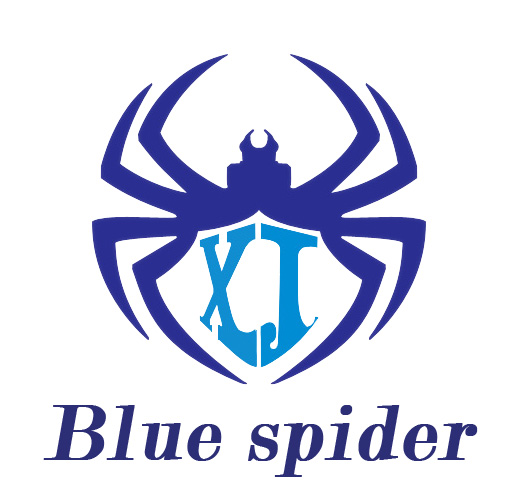 Blue Spider |
Team Contact: Institutes: |
| Team Profile: | Blue Spider, founded in 2009, is a collegial team which belongs to Xi’an Jiaotong University Engineering Workshop. Our main task is to develop high-performance software in order to drive Nao Robots to play better in football matches. The goal of our team is to participate in the RoboCup World Championships and also improve students’ ability of programming as well as innovation practices. At present, our team consists of two professors, three postgraduate students and seven undergraduate students. In 2013, we took part in the Chinese RoboCup Open Competition and achieved the fourth-place finish in the Standard Platform League competitive programs. At the same time, we do some related scientific researches through the platform of Nao Robots and take an active part in public welfare activities as well. With the efforts of all team members, we believe that we will achieve more success at the RoboCup World Championships. |
| Research Topics: | Not available |
| Team Report: | Not available |
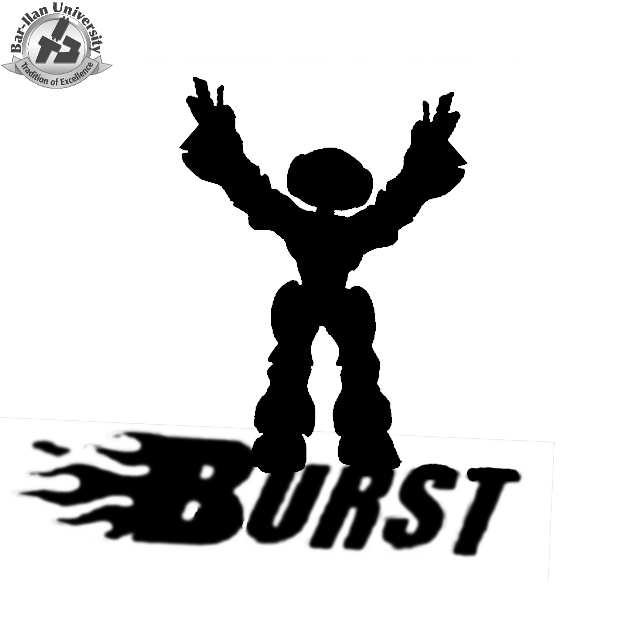 BURST |
Team Contact: Institutes: |
| Team Profile: | Team consists of graduate and undergraduate students of Bar-Ilan University. BURST participated in Robocup 2009. BURST qualified to the top 16 in Robocup 2009. |
| Research Topics: | Learning bi-pedal walking, Multi-robot formations, Multi-robot area patrol, Visual SLAM |
| Team Report: | BURST09Report.pdf |
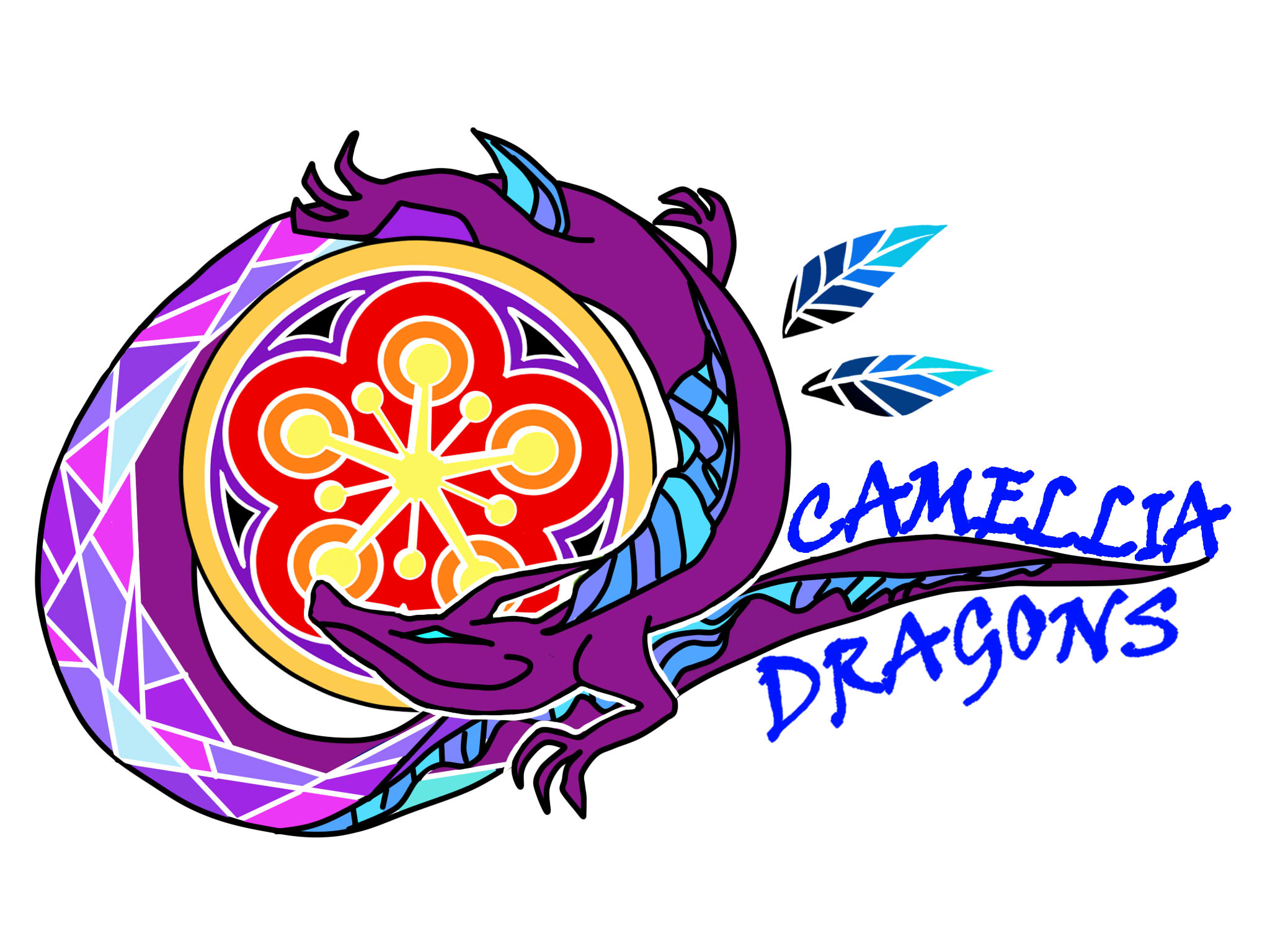 Camellia Dragons |
Team Contact: Institutes: |
| Team Profile: | Camellia Dragons was organized in October, 2013 at Aichi Prefectural University (APU), Japan. The team has been participated in the Standard Platform League (SPL) competition for RoboCup Japan Open since 2014. The results were first place in 2014, 2015 and 2018, and second place in 2016 and 2017. The team participated in the SPL drop-in player competition and the SPL technical challenges in RoboCup 2015 and the SPL main competition in RoboCup 2016, 2017 and 2018. |
| Research Topics: | Cooperative behavior, Real-time object recognition, Dynamic role assignment, Self-localization, Human-robot interaction. |
| Team Report: | 2017 Team Report |
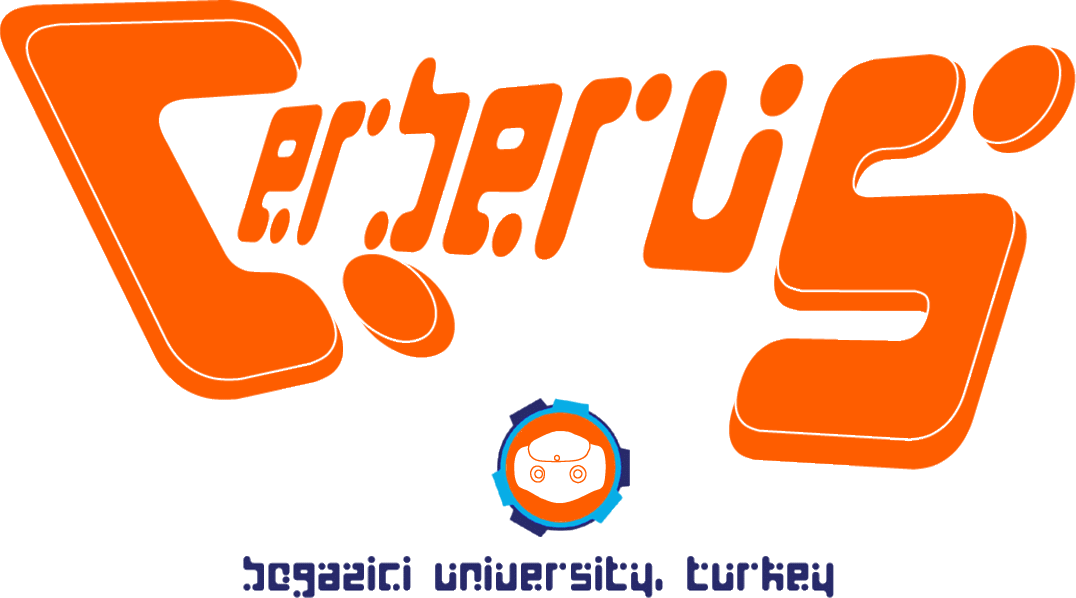 Cerberus |
Team Contact: Institutes: |
| Team Profile: | Cerberus has been participating in RoboCup SPL competitions since 2001 except 2004. Cerberus was ranked first in the Technical Challenges in 2005 and made it to the quarter finals in 2006 and 2008. Cerberus took the fourth place in RoboCup German Open 2007. Cerberus 2015 team consists of seven students and their advisor Prof. H. Levent Akın. Two of the members are PhD students and one of them is an MSc student. The other members are undergraduate students who are participating in the team as a part of their graduation project. Our main focus is the development of successful autonomous multi-agent systems. |
| Research Topics: | Multi-agent planning, reinforcement learning, computer vision. |
| Team Report: | Team Report |
 Crude Scientists |
Team Contact: Institutes: |
| Team Profile: | The Crude Scientists Team is from the Electrical Engineering Department of National Chung Cheng University, Taiwan. We were founded in 2009 and have participated the RoboCup 2009 @home league in Singapore. After that we changed our research topic into SPL league and participated every RoboCup Japan Open competition since 2012. In both 2012 and 2013 the Crude Scientists Team reached the first place. In 2014, we intend to participate in the RoboCup Japan Open Championship and the RoboCup World competition in Brazil. |
| Research Topics: | robot intention detection and robot acoustic communication |
| Team Report: | Not available |
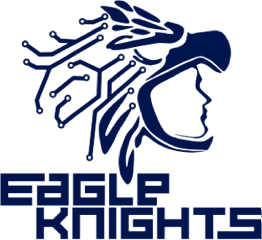 Cuauhpipiltin |
Team Contact: Institutes: |
| Team Profile: | The Cuauhpipiltin SPL team is an international RoboCup 2012 SPL participant. Our project is a collaborative effort of five renowned mexican institutions: ITAM, CIMAT, UNAM, DEMAT-UG, and CINVESTAV. The team consists of undergraduate students from ITAM, UNAM and DEMAT-UG and master students from CIMAT as well as five researchers. Our team was founded as the Eagle Knights team in ITAM in 2003, competing with the Aibo robots in RoboCup 2005, 2006, and 2007, and with the Nao Robots in RoboCup 2008 and 2009. This year, we compite under the original nahua name Cuauhpipiltin from cuauhtli (eagle) and pilli (noble person), one of the two high ranking mexica military orders. |
| Research Topics: | Vision, localization, motion planning and control |
| Team Report: | tdp_spl_ek_robocup2012.pdf |
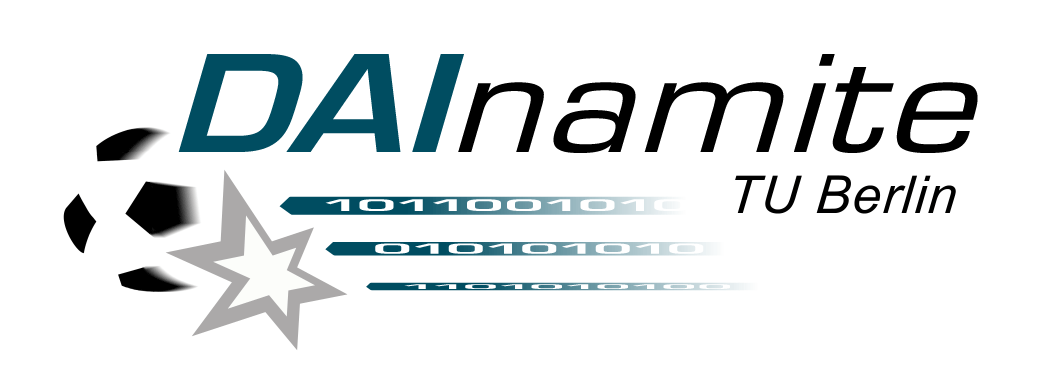 DAInamite |
Team Contact: Institutes: |
| Team Profile: | Team DAInamite transitioned in the end of 2011 from 2D-simulation to SPL. The team is constituted of individuals from Faculty IV (EECS) and Faculty II (Math&Nat.Sc.) of TU Berlin and participates in SPL related activities since its debut in German Open 2012 competitions. |
| Research Topics: | bipedal locomotion, multi-agent systems and coordination |
| Team Report: | DAInamite TDP 2014 |
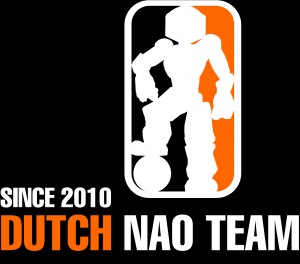 Dutch Nao Team |
Team Contact: Institutes: |
| Team Profile: | The Dutch Nao Team consists of bachelor students, master students and alumni, supported by a senior staff-member. The team debuted at the German Open 2010 and made its breakthrough by qualifying for RoboCup Istanbul in 2011. In 2017, the team started its own new framework where each module represents one algorithm handling a task in the football playing robot. |
| Research Topics: | Computer vision, behaviour control, probabilistic robotics, machine learning |
| Team Report: | 2021 Team Report |
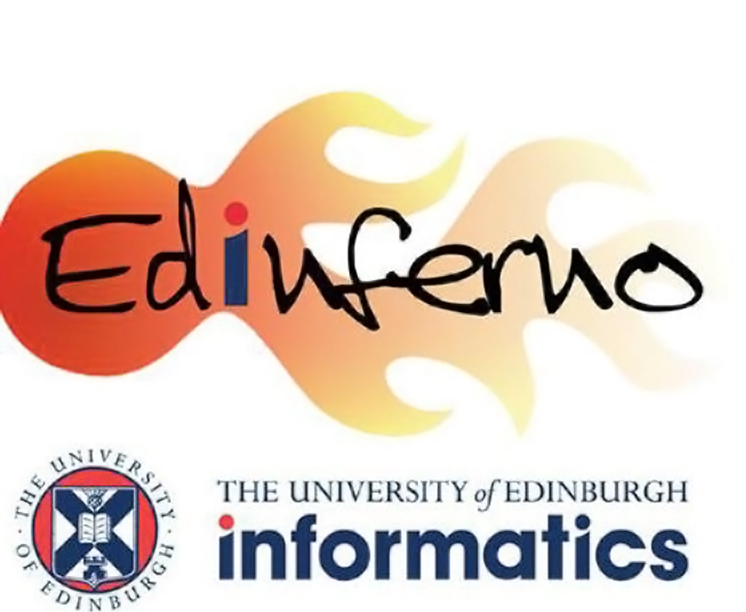 Edinferno |
Team Contact: Institutes: |
| Team Profile: | Our team made its RoboCup debut in the 2011 world cup held in Istanbul, Turkey, where we entered both in the Standard Platform League and the 2D Simulation League. We competed in the 2012 Mexico City RoboCup competition, where our team reached the quarter-finals, losing to the defending champions. We have participated from every year since, and from 2015 we are constructing from the ground up a Robot Operating System (ROS) based infrastructure. With past years experience and ample ROS knowledge, we aim to participate on the drop-in competition and technical challenges, and provide a solid foundation for future iterations building towards the main competition. |
| Research Topics: | Autonomous decision making under uncertainty, learning in single/multi-agent environments, HRI and strategic interaction and navigation through intention prediction. |
| Team Report: | Edinferno 2015 Team Report |
 HTWK Robots |
Institutes: |
| Team Profile: | HTWK Robots (formerly Nao-Team HTWK) is a RoboCup team that consists of graduate and undergraduate students of Leipzig University of Applied Sciences and was founded in 2009. The team participated in RoboCup and RoboCup German Open events from 2009 onwards. |
| Research Topics: | Evolutionary Algorithms, Biped Walking, Artificial Intelligence, Multi-Robot Coordination, Computer Vision, Localization |
| Team Report: | 2019 Team Report |
 HULKs |
Institutes: |
| Team Profile: | HULKs is student association of graduate and undergraduate students established in 2013 working in their leisure time or in thesis works on RoboCup SPL topics. We developed an own NAO framework. Team members participated at RoboCup from 2014 to 2018, IranOpen 2017, 2018, GermanOpens in 2014, 2015 and 2017, 2018 and EuropeanOpen in 2016. For 2015, 2017, 2018 and 2019 we were prequalifed for the RoboCup and last year we became fourth at RoboCup. We organize the RoHOW for the last five years. |
| Research Topics: | Fast and reliable software frameworks, biped walking, machine learning, computer vision, path planning |
| Team Report: | 2016, 2017, 2018, 2019, 2021 |
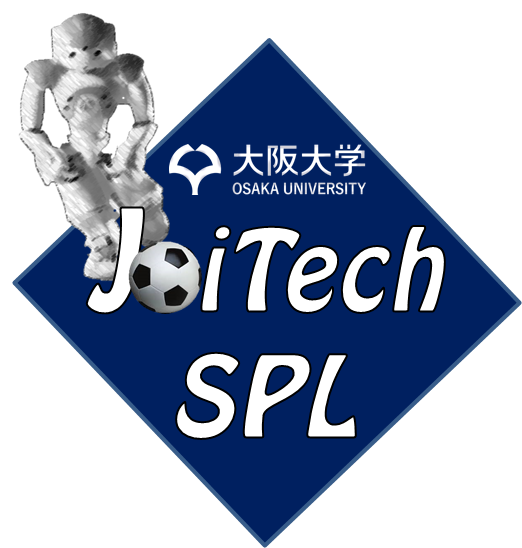 JoiTech-SPL |
Team Contact: |
| Team Profile: | Team JoiTech-SPL is originally derived from RoboCup team JoiTech, which participated in competitions of Humanoid AdultSize League since Japan Open 2010. Team JoiTech is composed of masters and doctoral students at Emergent Robotics Laboratory, Osaka University. This team was first started up as a new team in cooperation with students at Osaka Institute of Technology in RoboCup Japan Open 2010. The team name, JoiTech, is an acronym for “JEAP and Osaka Institute of Technology”, and it also means “joint team with Institute of Technology” and “enjoy technology”. The team had focused on Humanoid League AdultSize for several years. In RoboCup 2013 it took the league champion and best humanoid award. Then we decided to shift our focus to Standard Platform League. As the new team also kept the spirit of the original team, we design our team name by adding “SPL” to the original team name “JoiTech”. |
| Research Topics: | Localization and Multi-Agent Cooperation |
| Team Report: | Not available |
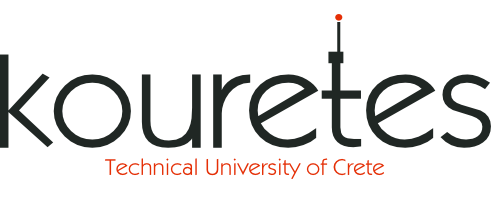 Kouretes |
Team Contact: Institutes: |
| Team Profile: | Kouretes is the RoboCup team of the Technical University of Crete in Chania, Greece. The team consists mainly of undergraduate students working on their diploma thesis on selected robocup-related topics. Kouretes participates in RoboCup competitions since 2006. The team ranked 2nd in the MSRS contest at RoboCup 2007, 1st in the SPL-MSRS league at RoboCup 2008, 3rd in the SPL-Nao league at RoboCup 2008, and 2nd in the SPL Open Challenge at RoboCup 2011. In 2013, the team released NAOKinematics, a stand-alone C++ library for complete kinematics of the NAO humanoid robot. |
| Research Topics: | robot software architectures, humanoid robot kinematics, onmidirectional stable walk, reliable local and global state estimation, dynamic team coordination |
| Team Report: | TDP 2013 |
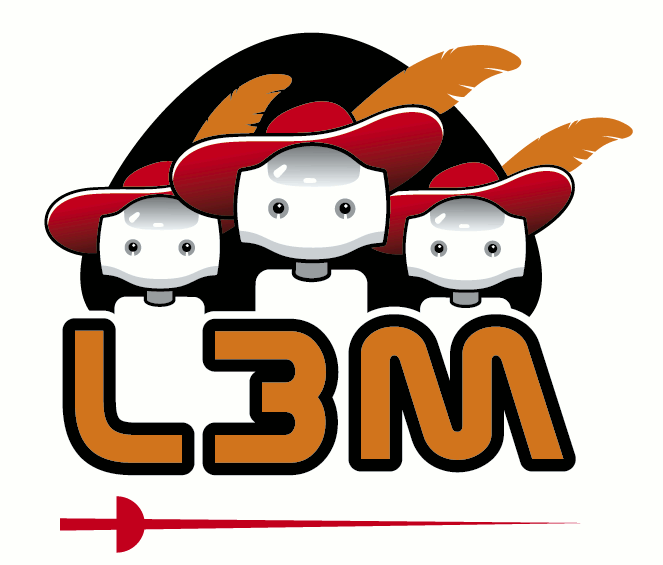 L3M |
Team Contact: Institutes: |
| Team Profile: | The L3M team (alias “Les Trois Mousquetaires”, “Los Tres Mosqueteros”, “The Three Musketeers”) will be a French-Spanish joint team composed of master students and professors from Universities and institutes of both countries. French members are within “Universite de Versailles”, “Universite Paris 8” and “ISTY” Versailles University Engineering school. Spain members come from “Universidad de Murcia” and “Universidad Politecnica de Valencia”. The French and Spanish members participated in the AIBO league for several years. Best results of L3M participations in RoboCup include 1st rank in 1999, 2nd in 2001, and fourth in 2002. The team Los Hidalgos from Spain won the RomeCup in 2010 in the SPL. |
| Research Topics: | Mobile robotics, legged locomotion, mechanics, real time embedded systems, sensorization and perception, embedded vision. |
| Team Report: | N/A |
 Linköping Humanoids |
Team Contact: Institutes: |
| Team Profile: | Linköping Humanoids is a joint effort at Linköping university between the student association FIA Robotics and the Division for Artificial Intelligence and Integrated Computer Systems (AIICS) at the Department of Computer and Information Science (IDA). |
| Research Topics: | AI, cognitive robotics, multi-agent systems, machine learning, stream reasoning, and software development for autonomous systems. |
| Team Report: | Not available |
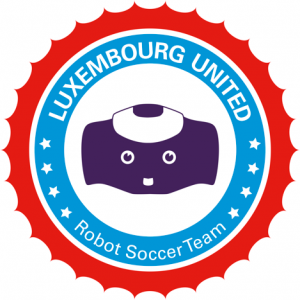 Luxembourg United |
Team Contact: Institutes: |
| Team Profile: | Luxembourg United, created early 2016, can be considered a relatively young team. We are part of the Social Robotics Laboratory of the SnT-uni.lu. We created the team to address challenging research questions, motivate students, provide applications for the industry and federate a wide range of research areas under a common framework: robot soccer competition. Our team background is in Machine Learning, Optimisation, Multi-Agent Systems, Coalition Formation, Distributed AI, Human-Robot Interaction and security for mobile service robots. We built our full-size pitch early this year, as per the latest official regulations, in the heart of Luxembourg’s European institutions and look forward to host friendly competitions. We attended RoHOW in Hamburg (2016) and participated to the German Open (2017) in Magdeburg, where we won the 1st place of the Challenge Shield. |
| Research Topics: | Deep learning, reinforcement learning, passing, kicking motion, balance walking, optimisation, human-robot interaction. |
| Team Report: | 2017 Qualification |
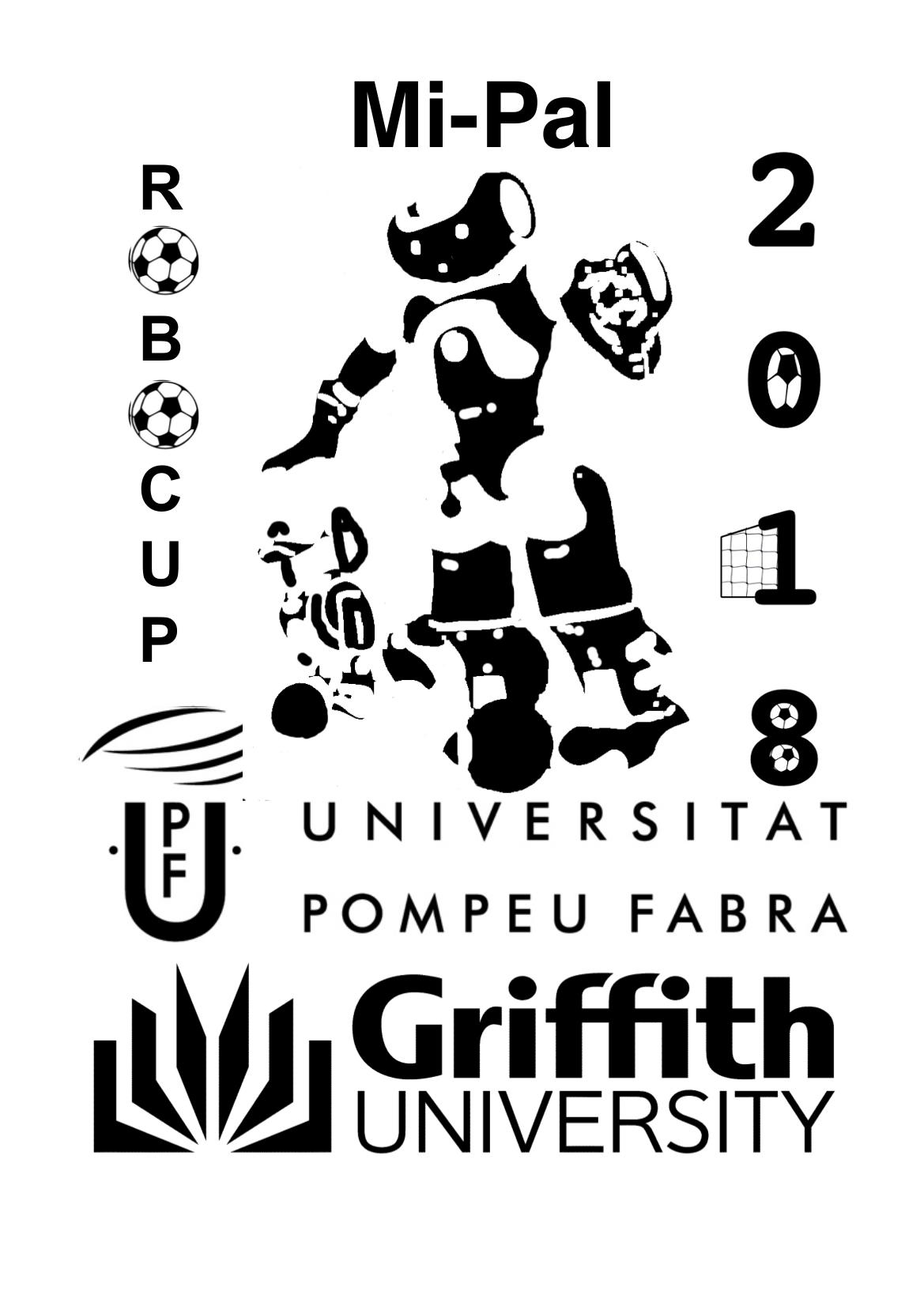 MiPal |
Team Contact: Institutes: |
| Team Profile: | We build behaviours using a Behaviour Based-Control (NNC) architecture. Our behaviours are encoded as logic-labelled finite state machines (LLFSMs). The Llfsm can be considered as Augmented Timed Finite-State Machines similar to the original LISP-based behaviours of the subsumption architecture and the Toto robot. Our advances are that LLFSMs are sequentially executed by a pre-defined schedule avoiding issues of timing and controlled concurrency (as opposed to the event-driven nature of executable UML state-charts). We can compile them for simple-C, C++ and swift (and interpret them for LISP and Haskell). We also produce Kripke models for their formal verification with NuSMV. We demonstrate practical quality of BBCcontinuous integration of behaviours by using a headless simulator. We also work on algorithms for computer vision, adapting deep-learning methods to the scene recognition of all the relevant objects in a soccer match and also enabling their fast execution in the reduced CPU power on boards of roots to achieve high frame-rates. Lately, we have mixed the emerging technologies of virtual reality (and headset devices and controllers) to explore tele-existence. In particular, we have investigated the reactions of adults and children to being immersed in the body of a Nao and engage on a soccer competition with autonomous Naos under conditions similar to the RoboCup Standard Platform League. |
| Research Topics: | Software Engineering For Robotics / Computer Vision / Merging Task Planning and Motion Planning / Agents and Reasoning |
| Team Report: | Team Description Paper |
 MRL-SPL |
Team Contact: Institutes: |
| Team Profile: | MRL-SPL team, under the supervision of Qazvin Azad University (QIAU), is one of the research groups of the Mechatronics Research Laboratory (MRL), dedicated to working in the field of biped robots. MRL is present in RoboCup different leagues since 2002. We have been an active participant of RoboCup SPL since 2009. The team has achieved three 1st place in RoboCup Iran Open and one 3rd place in RoboCup German Open. |
| Research Topics: | Online Joint/Camera Calibration, Framework Development, Monte Carlo Self-Localization, Active Vision and Dynamic Head Motion, Computer Vision using Neural Network Learning Methods, Multi-Agent Cooperation and Coordination, Biped Walk, KinetoStatic and Dynamic Analysis, Ground Reference Points in Biped Locomotion, Off-Line and Online Walking Pattern Generation, Simplified Dynamic Models of a Biped Robot Considering the Dynamics of Upper Body. |
| Team Report: | Not available |
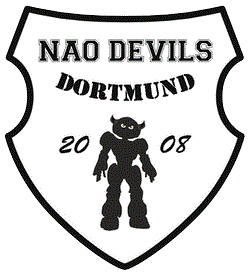 Nao Devils |
Team Contact: Institutes: |
| Team Profile: | The team consists of researchers and students of TU Dortmund University. We participate in RoboCup competitions since 2002 with several different teams: Microsoft Hellhounds and as part of the German Team (4-Legged-League), DoHBots (Humanoid League), and BreDoBrothers (together with University Bremen) and now as Nao Devils Dortmund in the Standard Platform League. |
| Research Topics: | biped walking, computer vision, stochastic filtering, artificial intelligence, deep learning, reinforcement learning, beam forming |
| Team Report: | 2019 Team Report |
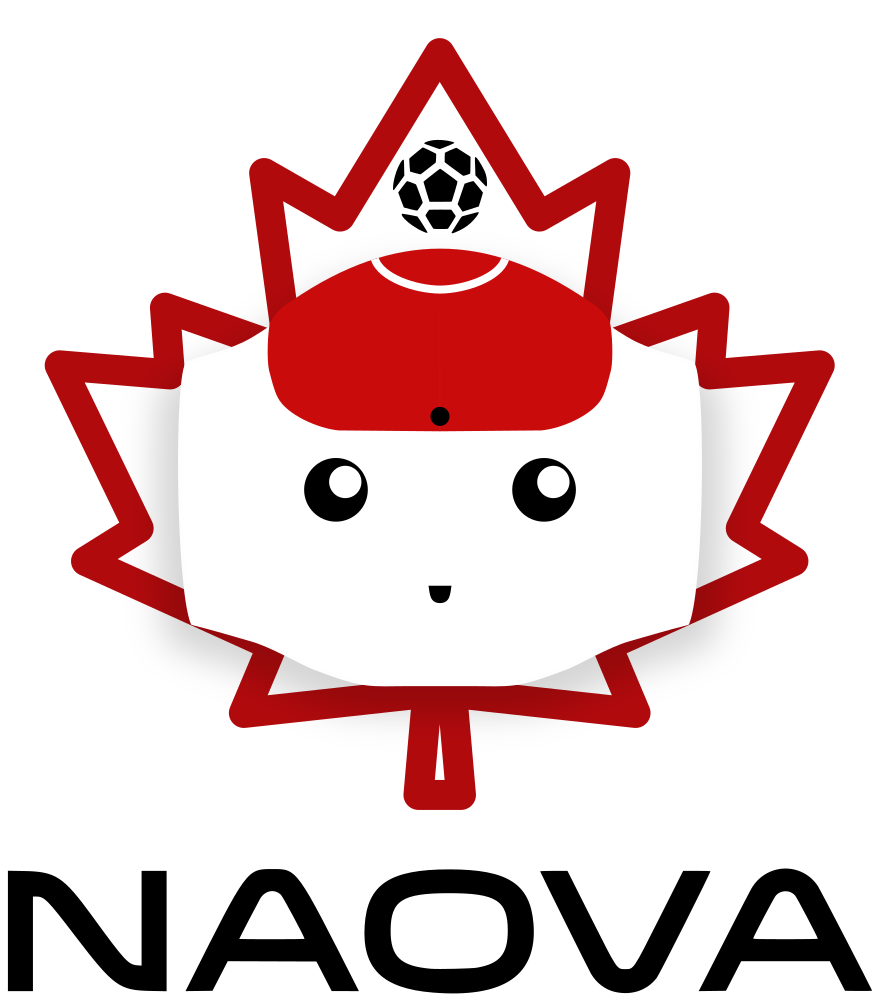 Naova ETS |
Team Contact: Institutes: |
| Team Profile: | Naova is a relatively young team, with one year experience in the standard platform league (SPL) division and in various other divisions in robotics, and we strive to develop our skills in the SPL division. Composed of 15 engineering students from École de Technologie Supérieure (ÉTS) – Montréal, Québec, Canada. The team consists of a pool of a diversified and talented group of engineering students with various background expertise whom all share the same passion for robotics and its applications. The scientific university club Naova pushes for its members to surpass themselves. By their active involvement in the clubs day-to-day activities , the members get a chance to prove themself which is an opportunity to show their engagement and expertise in a competitive environment. The international competition is a good opportunity for education, advancement and innovation of the members of the club. |
| Research Topics: | Gate generation; deep learning; reinforcement learning; nonlinear control; vision. |
| Team Report: | Not Available |
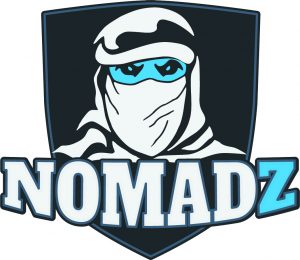
|
Team Contact: Institutes: |
| Team Profile: | The NomadZ from ETH Zurich, Switzerland, participated for the first time in the RoboCup 2016 Team Competition. The team consists of five to ten graduate students from the Department of Information Technology and Electrical Engineering and the Department of Mechanical and Process Engineering and are supervised by four Ph.D. students. Our work is based on the B-Human code release 2013 and we have implemented modifications and additions in the area of perception, behavior and to a limited extent in motor control. |
| Research Topics: | Automatic calibration, Deep Learning, Kicking, Optimal Game Strategy, Sensor Fusion. |
| Team Report: | Not available |
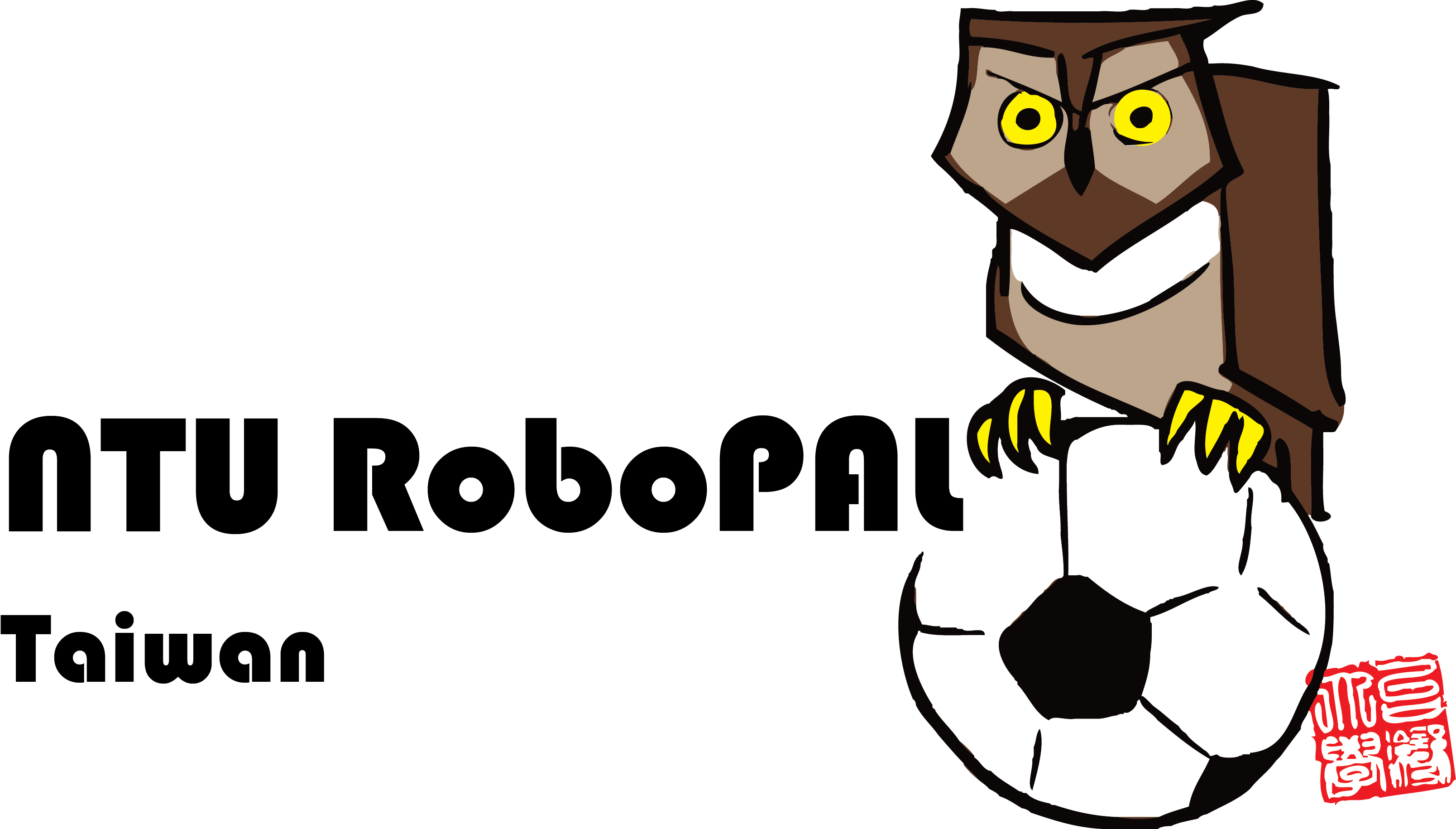 NTU RoboPAL |
Team Contact: Institutes: |
| Team Profile: | The team consists of graduate and undergraduate students highly interested in solving real-world multirobot research issues in terms of perception, behavior, and motion. Started from 2009, NTU RoboPAL participated in RoboCup SPL and made it to the quarter-final in 2009 and won the third place in 2011. |
| Research Topics: | Multi-robot localization and tracking, multi-robot cooperative perception, activity recognition, motion planning, multi-robot navigation, imitation learning |
| Team Report: | 2015 Team Report 2019 Technical Report |
 Philosopher |
Team Contact: Institutes: |
| Team Profile: | Philosopher is a robot soccer team from the University of Tartu, Estonia, and so far, has been the only RoboCup participant from Estonia. The Team was established in January 2013, and successfully managed to prepare the materials, robots and strategies, as well as gain funding, within a comparatively-short time-interval, leading it to participate in the RoboCup Standard Platform League Championship 2014. We are also planning to participate in the 2015 Competitions, and have already been qualified to do so. In the 2014 Competitions, a couple of accredited companies sponsored our participation, and due to the Team’s satisfactory performance, in the upcoming competitions, not only they are supporting us again, but also some other companies have shown interest in sponsoring us heretofore. Our team consists of six student members, namely, Siim Schults, Viljard Puusepp, Rainer Keerdo, Anastasia Bolotnikova, Andres Traumann and Morteza Daneshmand, and two supervisors, namely, Gholamreza Anbarjafari and Alvo Aabloo. All the team members are doing, or already have done, their studies on subjects related to robotics. Besides, at the moment, they are constantly working on tasks contributing to the enhancement of their own part, which fall, mainly, in the areas of self-localization system, automatization of color calibration process, robot motion melioration and game strategy. |
| Research Topics: | object detection, development and enhancement of game strategy and melioration of such systems as localization and odometry |
| Team Report: | Not available |
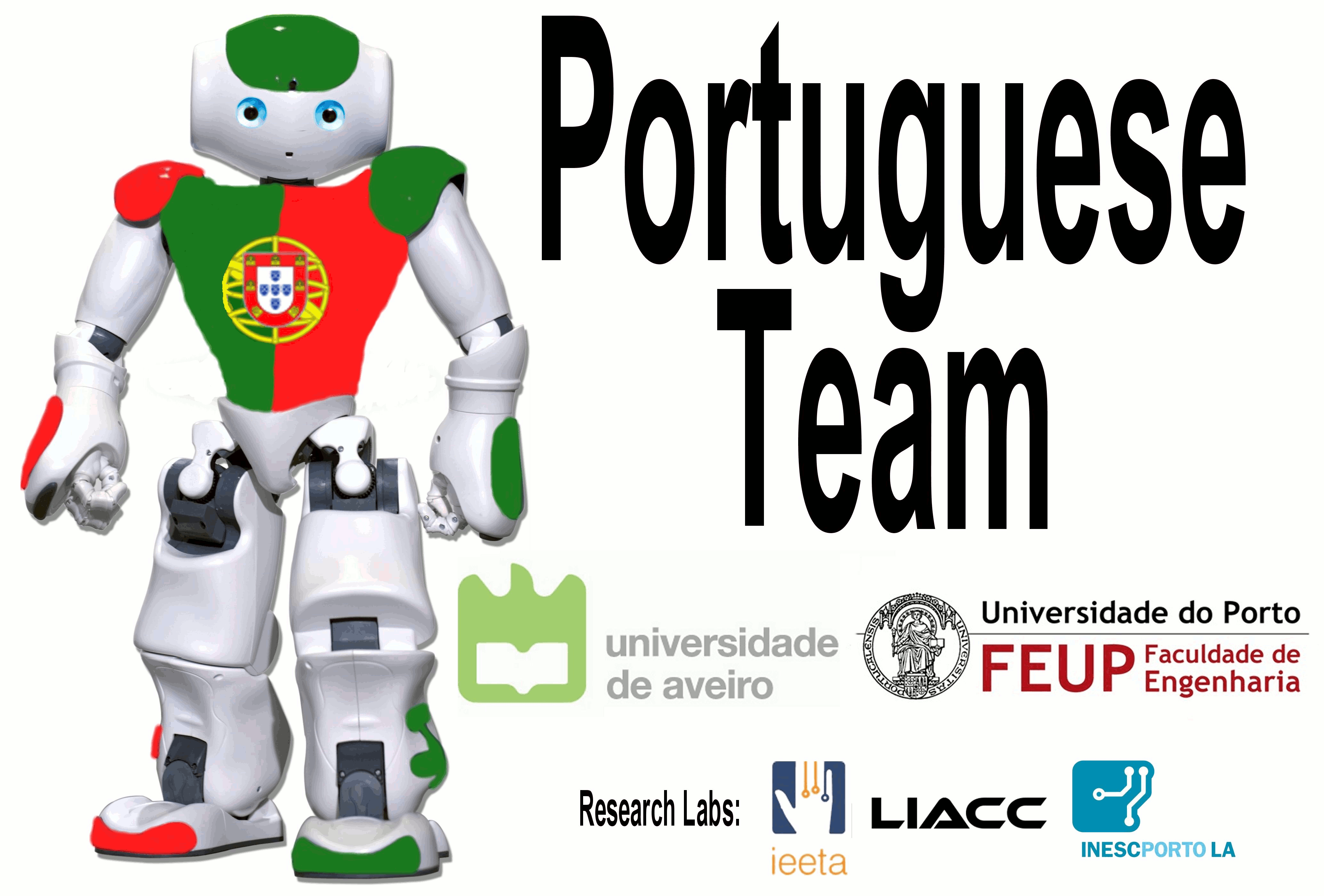 Portuguese Team |
Team Contact: Institutes: |
| Team Profile: | The Portuguese Team is composed by members of the three Portuguese teams that achieved better results in RoboCup European and World championships: FC Portugal, CAMBADA and 5DPO. Researchers from three different universities (Universities of Aveiro, Porto and Minho) in Portugal join efforts to build a new research oriented and competitive SPL team. |
| Research Topics: | Multi-Agent Systems (MAS); coordination in MAS; Agent based simulation; Game analysis, strategic reasoning and tactical modeling; Multi-robot monitoring and debugging; Sensor and information fusion; Real time image processing, including stereo vision; Bridging the gap between simulated and real robotics. |
| Team Report: | PortugueseTeam_TDP2012.pdf |
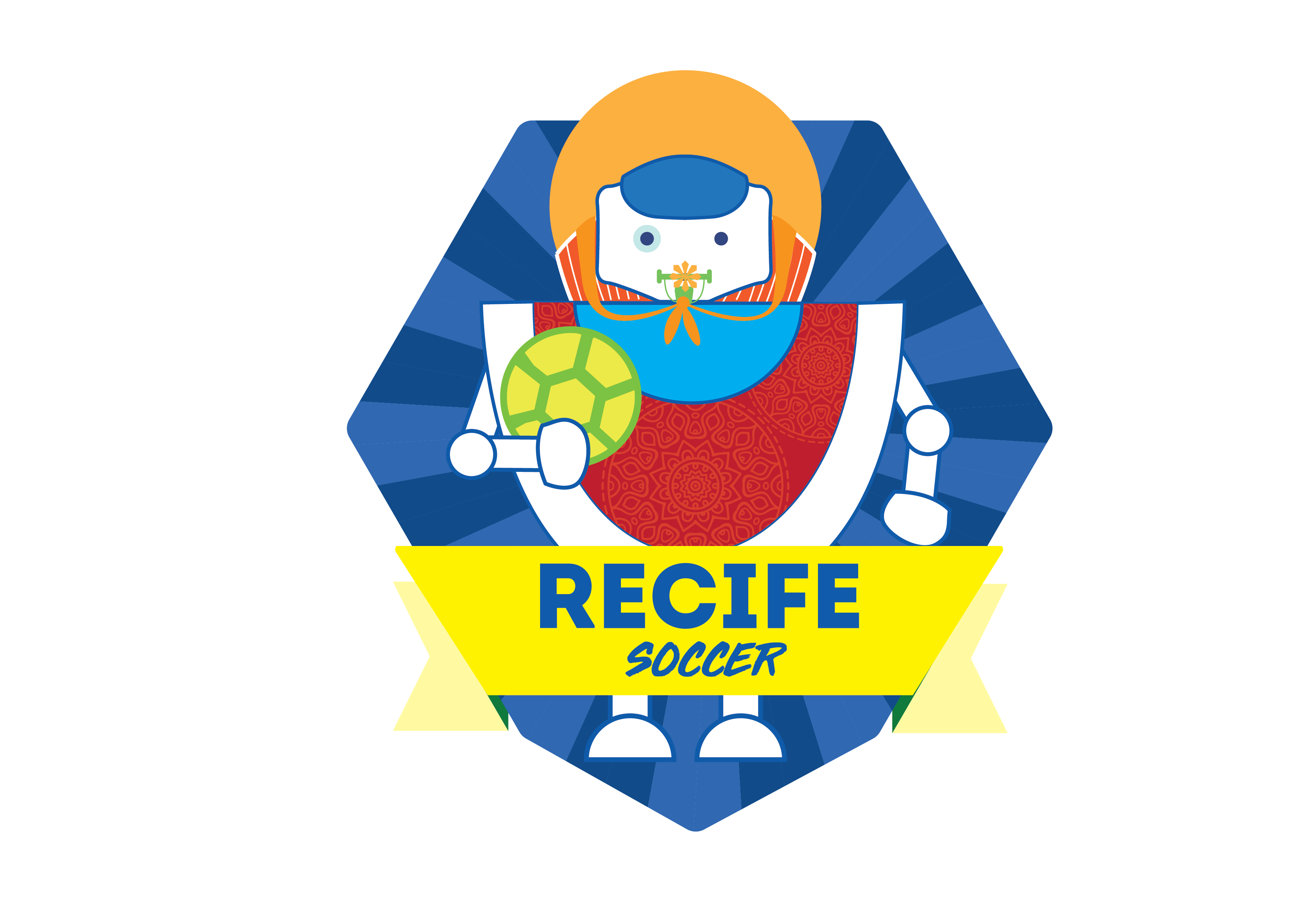 RECIFE Soccer |
Team Contact: Institutes: |
| Team Profile: | The RECIFE Soccer Team is composed by teachers, students and instructors of the legal organization of City Hall of Recife, which has as main activity to develop robotics activities in the public schools of the capital of Pernambuco.
These activities are included in Lines of Robotics, which advanced robots make up the 3 Line. In this line, the robots are purchased ready and the focus is on programming strategy. In this way, we have humanoid robots NAO and Drones DJI Phantom 3. The RECIFE Team has two divisions of work, which aims to participate in different categories of robotics competitions with humanoid robots. The RECIFE Soccer is the team that develops study and research in robot soccer and is trying, through this, in their first participation in ROBOCUP SPL. |
| Research Topics: | Machine learning and image processing fields like reinforcement learning and computer vision |
| Team Report: | N/A |
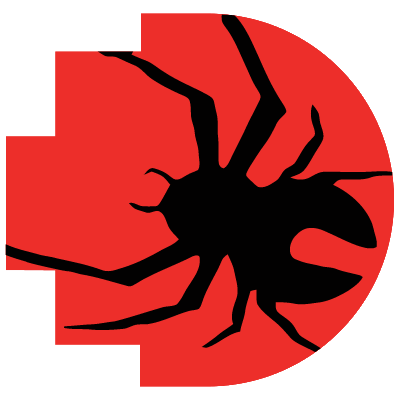 RedBackBots |
Team Contact: Institutes: |
| Team Profile: | RedBackBots are a new RoboCup SPL team from RMIT University. The team is mostly composed of undergraduate and postgrads students from the School of Computing Technologies in the STEM College. Students participate in RoboCup as part of their coursework studies, or as an external activity. The goal of the team is provide students with an opportunity to explore the field of autonomous robotics. The RedBackBots was started in early 2020. |
| Research Topics: | The RedBackBots team is part of the AI Innovation Lab at RMIT. The key research areas of the AII Lab are:
|
| Team Report: | N/A |
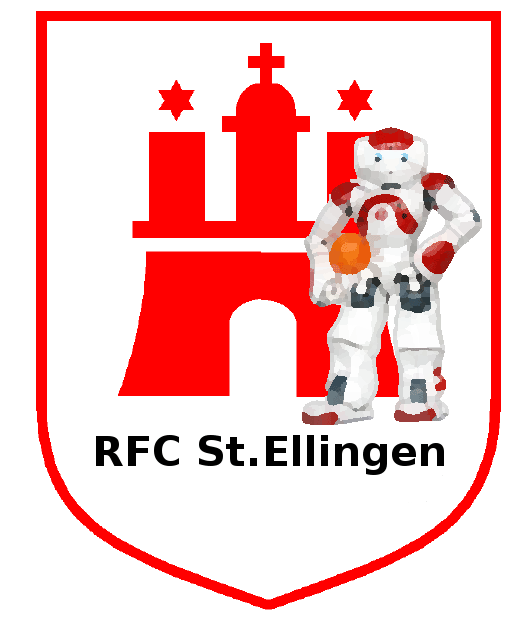 RFC St.Ellingen |
Team Contact: Institutes: |
| Team Profile: | The team consists of graduate and undergraduate students of the University of Hamburg. RFC St.Ellingen has been participating in RoboCup from 2004 to 2007 as “Hamburg DogBots” in the Four Legged League (FFL). Since 2009 the team is participating in the German Open SPL. The participation was part of the RoboCup courses (2003 until present), that offered undergraduate, master, diploma and PhD students the opportunity to study robotics in depth. During this period the research group “Technical Information Systems” (TIS) has been responsible for the courses.The team is also engaged in education and making Robotics accessible to a broad audience. The team has been offering public games in this time and in the last three years the team has been offering a one week project for high school students, where the students could program simple agents in the RoboCup setting. |
| Research Topics: | Self localization, image analysis, machine vision, humanoid robot motion, reinforcement learning |
| Team Report: | N/A |
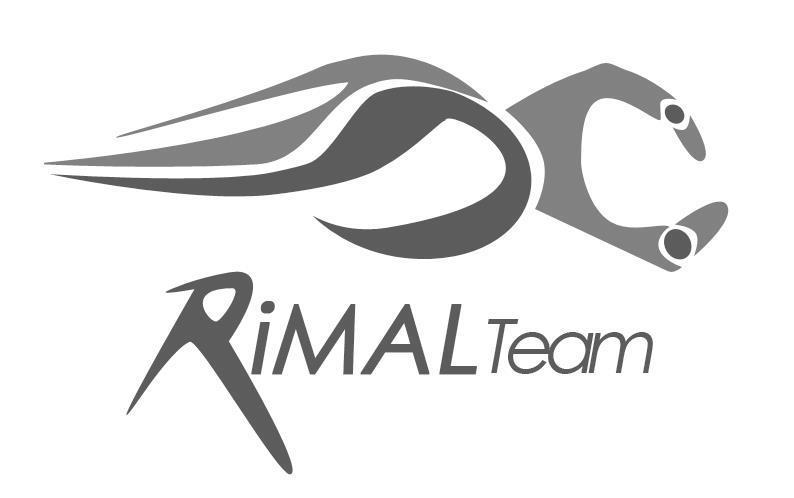 Rimal Team Humanoid |
Team Contact: Institutes: |
| Team Profile: | A group of Faculty and students from Systems Engineering Department at King Fahd University of Petroleum and Minerals. This team is the first professional research team to participate in RoboCup Competition from Saudi Arabia. |
| Research Topics: | mobile and humanoid robots, embedded and mobile devices, localization, navigation, and mapping, planning and reasoning, decision making under uncertainty, adaptive systems |
| Team Report: | Report |
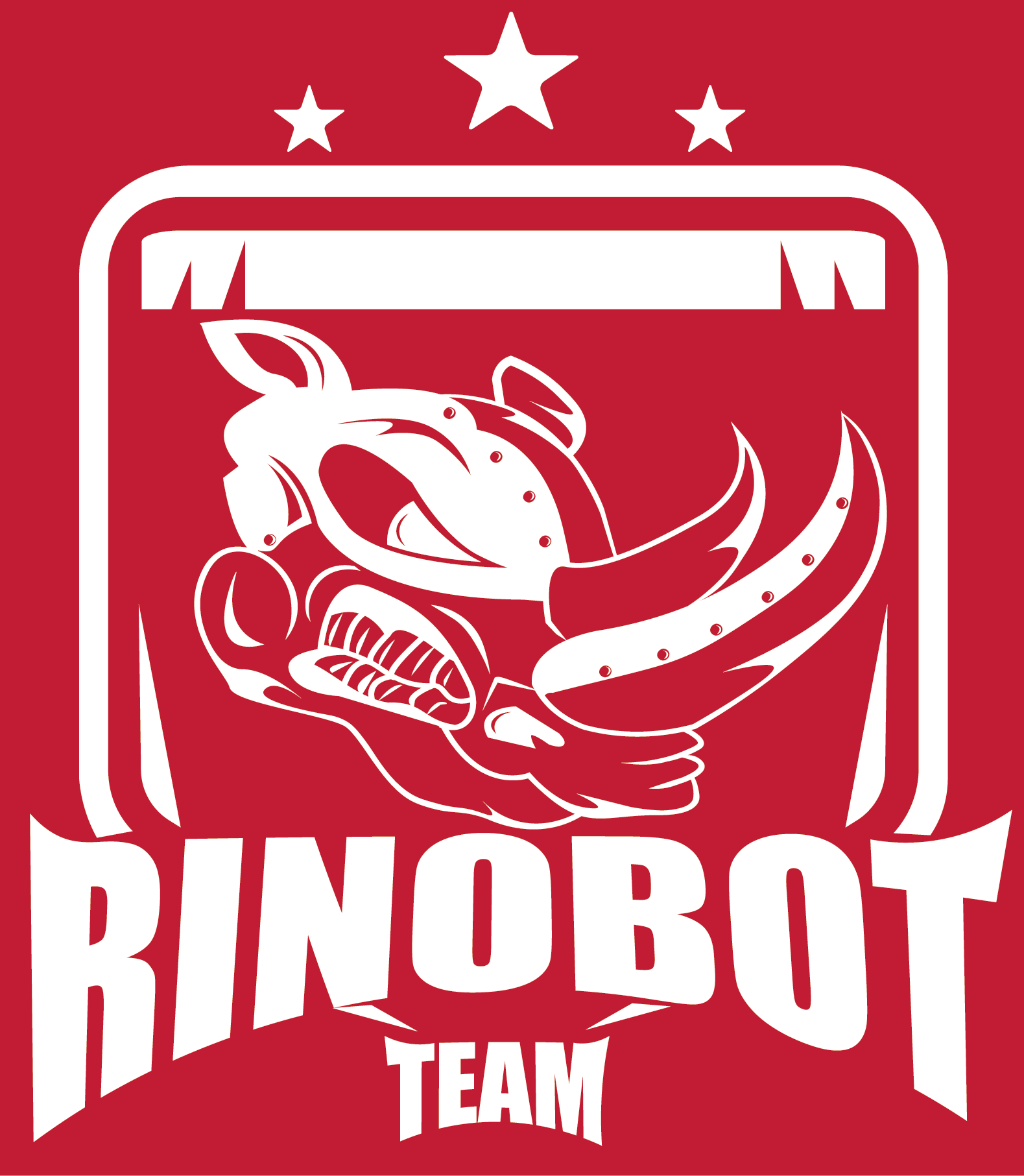 Rinobots-Jaguars |
Team Contact: Institutes: |
| Team Profile: | The Rinobot Team is based at the Federal University of Juiz de Fora. Our team was founded in 2016 and today includes more than 70 members from 20 graduation courses, among them Electrical Engineering, Mechanical Engineering, Computer Science, Mathematics, and others. We have 5 different categories, including the SPL. The SPL Category started their activities in June 2017 and achieved the first place at Latin America Robotics Competition 2017 (LARC2017). Our other categories won several prizes as well. |
| Research Topics: | Computer Vision, Localization, Motion Control, Audio Signal Processing, Human-robot Interaction, Machine Learning. |
| Team Report: | Not available |
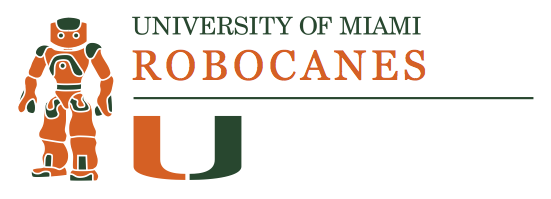 RoboCanes |
Team Contact: Institutes: |
| Team Profile: | The Team consists of graduate students of the AI, Games & Robotics LAB. RoboCanes participated in RoboCup since 2010 in the 3D Soccer Simulation League and reached 2nd places in the 2012 and 2014 World Cup, won the German Open 2011 and was runner-up at the Iran Open 2012. It is the team’s 4th year in the SPL. |
| Research Topics: | Learnable knowledge representation, motions, biped walking control, multi-agent cooperation, self-localization, obstacle avoidance, parameter optimization, reinforcement learning. |
| Team Report: | Not available |
 RoboEireann |
Team Contact: Institutes: |
| Team Profile: | RoboEireann is Ireland’s only SPL team and comprises students and staff from the Maynooth University Electronic Engineering and Computer Science departments. In previous competitions we have attained 1st place in RoboCup 2008 as part of NUManoids (a joint effort with Newcastle University, Australia), 1st place in RoboCup 2011 Technical Challenge, 2nd place in the 2012 German Open, and the quarter-finals of RoboCup 2013. |
| Research Topics: | Computer vision, robust localization, individual and multi-agent behaviour, closed-loop kinematics, software for autonomous systems. |
| Team Report: | Not available |
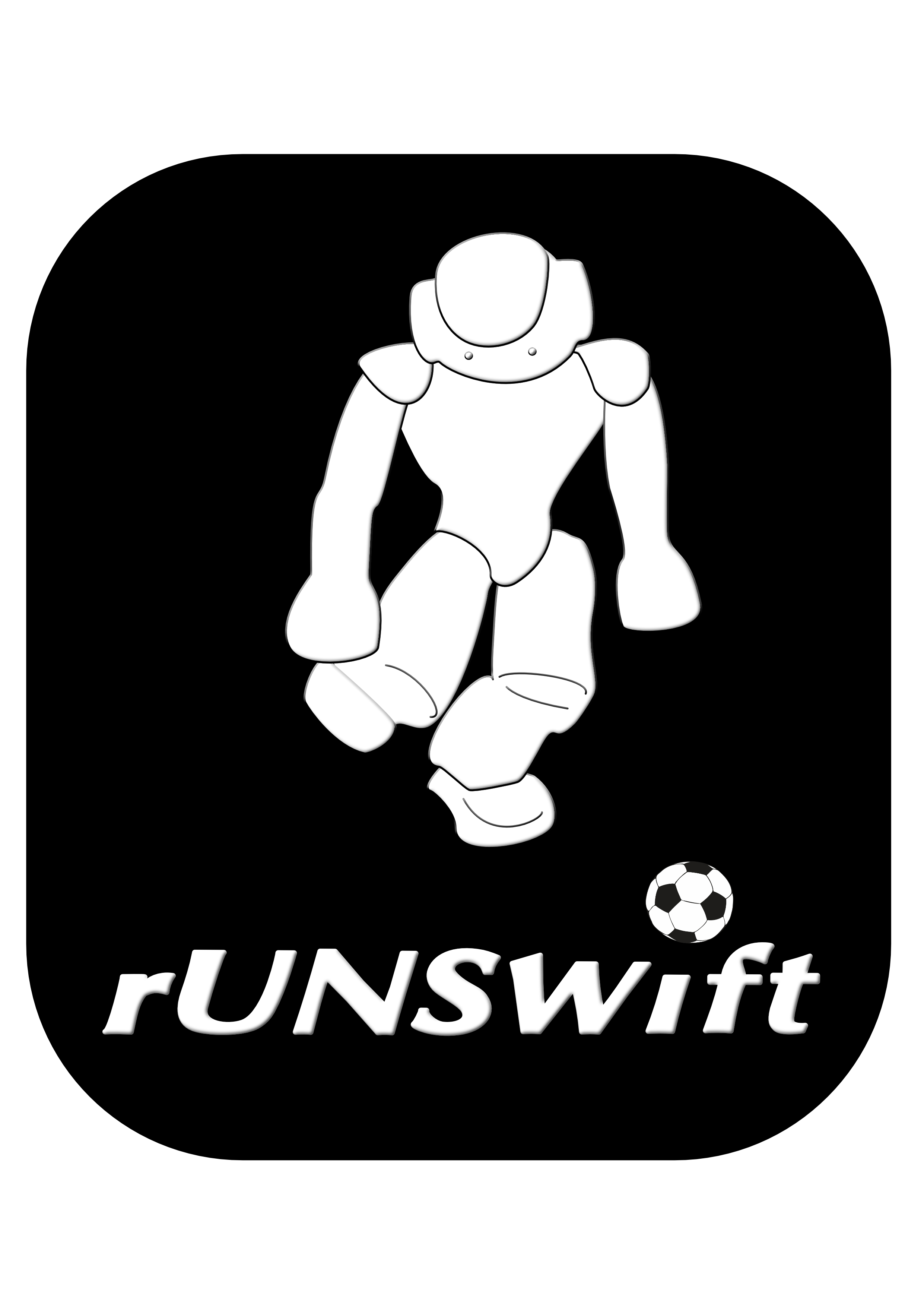 rUNSWift |
Institutes: |
| Team Profile: | rUNSWift is the University of New South Wales team in RoboCup SPL. The team is mostly made up of undergraduate students from Computer Science and Mechatronic Engineering, with some postgraduate and alumni members. Undergraduate students are often enrolled in an Honours thesis or Special Project course as part of their studies. At the international robocup SPL competition, the team won the championship in 2014 and 2015. |
| Research Topics: | Autonomous Systems is a priority research topic in robotics at CSE, UNSW. Our general research focus, of which the RoboCup SPL is a part, is to:
|
| Team Report: | 2019 Team Paper |
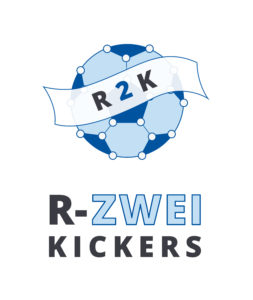 R-ZWEI KICKERS R-ZWEI KICKERS |
Team Contact: Institute: |
| Team Profile: | The R-ZWEI KICKERS are part of the Smart Machines working group at UAS Kaiserslautern, located in Zweibrücken, Rhineland-Palatinate. So far, we have remotely participated in the 2021 German Open Replacement Event of the SPL. Our team starts in RoboCup 2021 in two different local challenges. The R-ZWEI KICKERS were established in 2020 and currently consist of one professor and about 10 undergraduate and graduate students in the Department of Computer Science, as well as external volunteers. Currently, our code base is a modified version of the B-Human Code Drop 2019. We have modified team behaviour control and the SimRobot environment to allow for automatic test procedures. Completely custom features include the Teach-In of robot behaviour, a data mining analysis and coupled it to a reinforcement learning (Q-learning) module. Additionally, we have developed our own Image recognition and multi-object detection model. |
| Research Topics: | Machine Learning and Data Driven Development, Hybrid AI, Team Coordination, Robust Multi-object Detection |
| Team Report: | N/A |
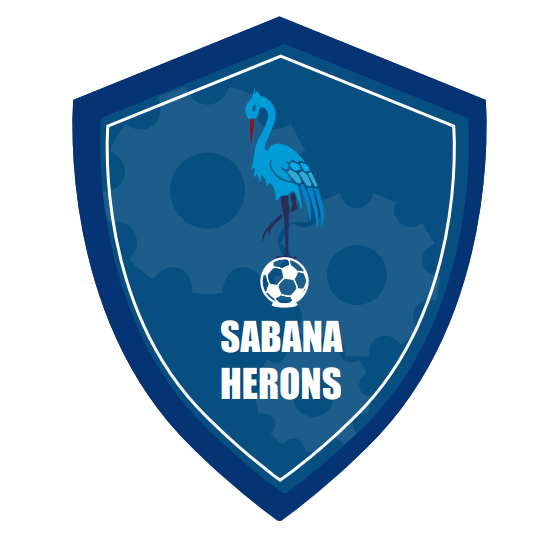 SABANA Herons |
Team Contact: Institutes: |
| Team Profile: | The SABANA Herons team is the result of the collaboration between the mechanical engineering and informatics engineering departments of the Universidad de La Sabana. The team was born out of the students’ desire to carry out projects that bring together different fields of engineering in order to solve complex problems that can be compared with real-world systems, as well as their desire to form multidisciplinary groups that require teamwork. Our team was founded in 2017 and has been gaining experience in different robotics competitions, some in the national context and others internationally. In recent years, the university has been able to participate in various global competition events, such as Shell Eco-Marathon Americas (Detroit 2017, Sonoma 2018 and Sonoma 2019) and RoboCup SPL 2019 in Sydney, Australia, where we got to the finals of the challenge shield. |
| Research Topics: | Distributed Optimization, Evolutionary Algorithms, Distributed Predictive Control, Game Theory. |
| Team Report: | N/A |
| Schulich DinoBytes |
Team Contact: Institutes: |
| Team Profile: | TBD |
| Research Topics: | TBD |
| Team Report: | TBD |
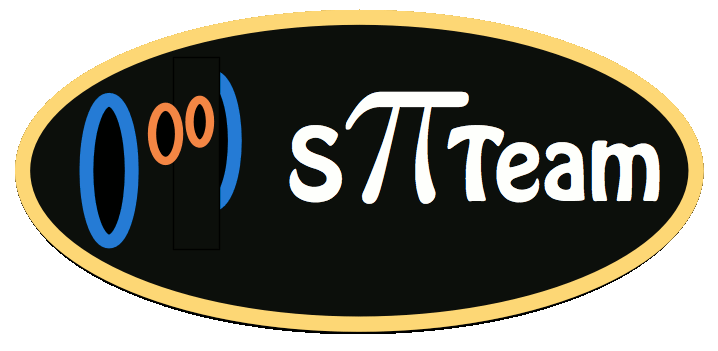 SPiTeam |
Team Contact: Institutes: |
| Team Profile: | Team consists of graduate and undergraduate students of URJC Robotics Lab. The members of the team participated in RoboCup (or regional competitions) since 2004 to 2008 (four-legged and SPL) in the TeamChaos. SPiTeam was created in 2009 to participate in the SPL league. Our best record was in German Open 2012, where we finisehd 5th in the rank. |
| Research Topics: | Self localization, robot cooperation, behavior architectures, Real Time 3D vision |
| Team Report: | report.pdf |
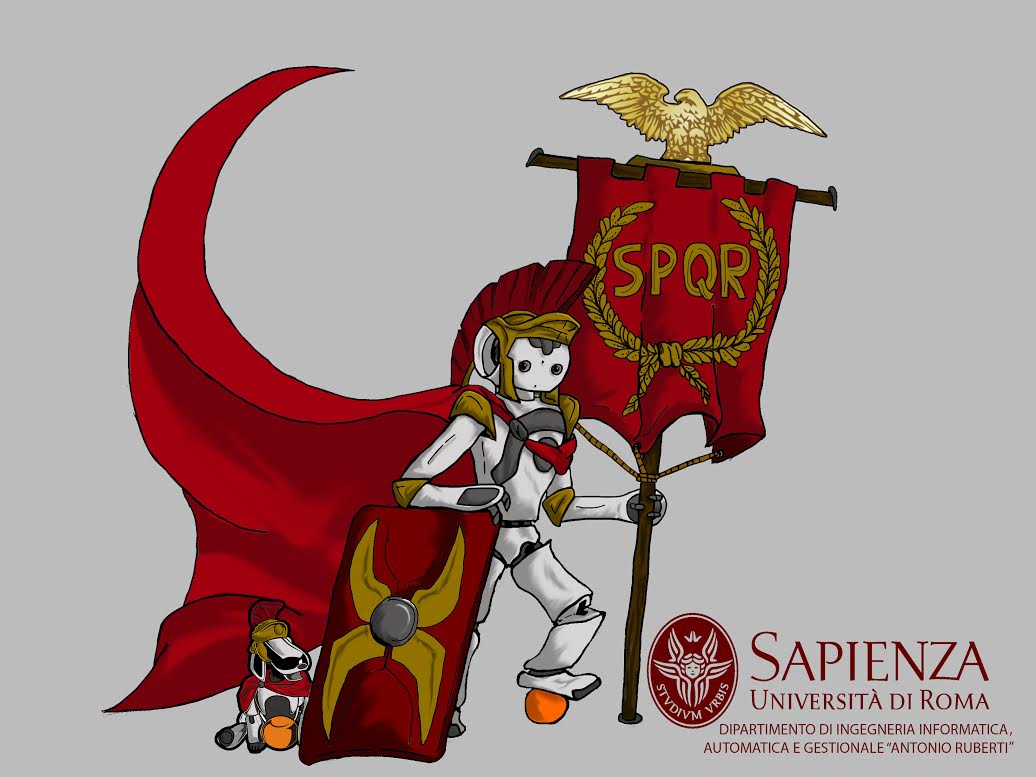 SPQR Team |
Team Contact: |
| Team Profile: | SPQR is the group of the Department of Computer, Control, and Management Engineering “Antonio Ruberti” at Sapienza University of Rome (Italy). SPQR Team has been involved in RoboCup competitions since 1998 in different leagues: Middle-size 1998-2002, Four-legged 2000-2007, Real rescue robots 2003-2006, @Home in 2006, Virtual-rescue since 2006 and Standard Platform League (SPL) since 2008. SPQR team members published a total of 18 papers in RoboCup Symposia (including best paper awards in 2006 and 2015), in addition to many other publications about RoboCup-related activities on International Journals and Conferences in Artificial Intelligence and Robotics (including IROS RoboCup Best Paper Award in 2016). |
| Research Topics: | Multi-robot coordination, Multi-object tracking, Robot learning, Perception, Localization. |
| Team Report: | 2018 Team Description Paper |
 Starkit Starkit |
Team Contact: Institutes: |
| Team Profile: | The Starkit team was organized in the autumn of 2018 in the Moscow Institute of Physics and Technology (MIPT), Russia, on the base of the Laboratory of Wave Processes and Control Systems. The founder of the team is an honorary graduate of MIPT – Azer Babaev. The team leader is Sergey Semendyaev. The SPL team captains are Roman Gorb and Aleksey Kozinov.
The team has two subteams – Humanoid League team and Standard Platform League team. Both teams consist of students that have to learn a lot of new specific information to participate in the Robocup competition since it is a new field of research in our institution. Our external goal is to participate and preferably to win RoboCup competitions. Our internal goal (inside MIPT) is to obtain knowledge in humanoid robotics and artificial intelligence and to teach new generations of students in this field. |
| Research Topics: | mechatronics, robot design, artificial intelligence |
| Team Report: | Team Research Report for RoboCup 2021 |
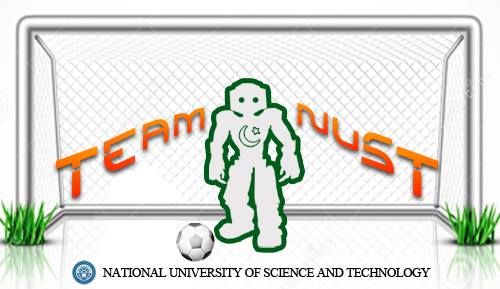 Team-NUST |
Team Contact: |
| Team Profile: | Team-NUST was established formally in 2013 with the aim of carrying out research in the rapidly progressing field of humanoid robotics, artificial intelligence, machine vision, motion planning, kinematics and navigation; with the motivation to participate in RoboCup Standard Platform League (SPL). We are working on robust and predictable kicking motion, multi objective behavior coordination, motion planning, situational awareness based on efficient perception and robust probabilistic multiagent localization. |
| Research Topics: | The team is working in RISE Research Center, part of SMME, NUST, with research in the field of cognitive robotics, machine intelligence focused on design, control and motion planning for robotics systems including mobile robots, humanoid robots, multi legged robots, intelligent bionics and robotic manipulators. |
| Team Report: | Team Report 2019 |
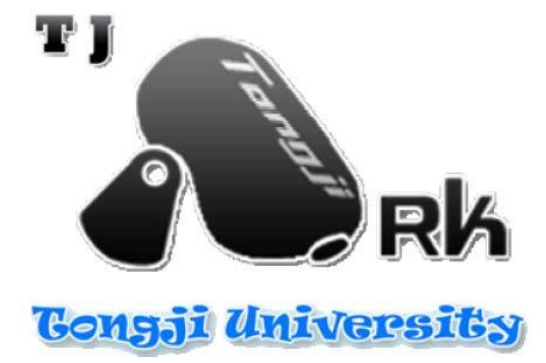 TJArk |
Team Contact: Institutes: |
| Team Profile: | TJArk was established in 2004 as a part of the Robots and Intelligent Systems Lab of Tongji University in China. The team consists of graduate and undergraduate students. All the members are from School of electronic and information engineering. The TJArk participated in the RoboCup SPL competition from 2006 through 2018. We entered the quarter finals in 2007, 2008, 2016 and the Champions Cup quarter finals in 2017. We finished in the third place in 2018. We are the SPL Champion in RoboCup China Open in latest six years. |
| Research Topics: | Pattern Recognition, Machine Learning, Computer Vision, Motion Control of Biped Robot, Multi-agent Systems, Path Planning |
| Team Report: | 2019 Team Research Report |
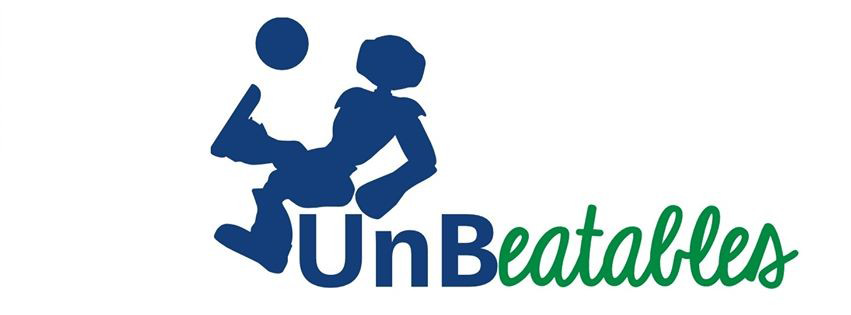 UnBeatables |
Team Contact: Institutes: |
| Team Profile: | Created in 2014 and affiliated with the University of Brasilia, UnBeatables is composed mostly of undergraduate students. It is a humanoid robotics research project and a community engagement activity, where the member visit the community which support the university to show children more about robotics. The team has achieved titles in both regional and international competitions. In 2018, we team up with Rinobot aiming to consolidate a Brazilian league and foster robotics field in Latin America. |
| Research Topics: | Motion control, human-robot interaction, indoor mapping and localization |
| Team Report: | Not available |
 UPennalizers |
Team Contact: Institutes: |
| Team Profile: | The University of Pennsylvania RoboCup team was one of the first participants in the original Sony Aibo league (renamed the Standard Platform 4-legged league in 2004), and participated in all the international competitions between 1999-2006. The team finished among at least the quarterfinalists in every one of those eight years. After a short hiatus in 2007-2008, we have reformulating the team with a new group of undergraduates and graduate students from various departments at the Engineering School at the University of Pennsylvania. |
| Research Topics: | Real time lighting invariant perception, robust and natural locomotion, dynamic coordination in multi-agent robotics soccer team |
| Team Report: | 2018 Team Report, 2016 Code Release |
 UT Austin Villa |
Team Contact: Institutes: |
| Team Profile: | Our team is from the University of Texas at Austin. We participated in the Aibo league starting in 2003 and started with the Naos in 2007. We also field a team in the RoboCup 3D simulation league. We won the 2009, 2010, 2012, 2016 and 2018 SPL US Opens. At the international RoboCup SPL competitions, we made the quarterfinals in 2009, 2015 and 2018, finished in 4th place in 2017, finished in 3rd place in 2010 and 2013, finished in 2nd place in 2016, and won the championship in 2012. |
| Research Topics: | Self localization, vision algorithms, multi-agent task allocation, obstacle avoidance, reinforcement learning, ad hoc teamwork, learned humanoid locomotion, Sim2Real learning |
| Team Report: | 2019 Team Report |
| UTH-CAR |
Team Contact: |
| Team Profile: | UTH-CAR is a new team in the SPL League. The team is formed by two Mexican institutions: the Technological University of Huejotzingo and the Autonomous University of Carmen. The project is formed by undergraduate students under the direction of researchers of both institutions. |
| Research Topics: | Humanoid Perception, Visual SLAM, Image Processing, Machine Learning. |
| Team Report: | N/A |
 UTS Unleashed! |
Team Contact: Institutes: |
| Team Profile: | UTS Unleashed! was established in 2003 and is known for its innovative style having developed the first dodge behavior in the legged league. The UTS Dodge transformed the game and was widely adopted after UTS introduced it in 2004. UTS Unleashed! were the Australian Champions in 2004, won the Scientific Challenges and were Runners Up at RoboCup 2004. In 2006 UTS were the first Robot Soccer Team to be invited to China where they played against all the Chinese Legged Teams in Exhibition Matches in Suzhou for China Science Week. In 2008 UTS Unleashed! joined forces with USTC robot soccer team to create WrightEagle Unleashed! More recently UTSUnleashed! developed the killer Ninja Kick. |
| Research Topics: | Artificial intelligence, Commonsense Reasoning, Multi-Robot Collaboration, Motion and Path Planning, Localization, Cognitive Modeling, Knowledge Representation, Attention, Anticipation and Autonomy |
| Team Report: | N/A |
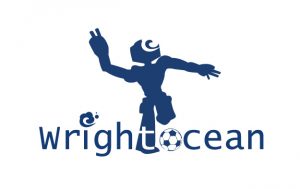 WrightOcean |
Team Contact: Institutes: |
| Team Profile: | WrightOcean, a team which belongs to Lab of Robotics, School of Information and Electrical Engineering, Ludong University in China, was established in April, 2012. It is a young and passionate team, and all of the members are undergraduates keen on robotics. The WrightOcean team participated in the Standard Platform League of RoboCup China Open in 2013 for the first time, and we were the runner-up (the TJArk from Tongji University was the champion) in a team competition. In 2014, we took part in three technical challenges and shared the third place with Dalian University of Technology. In 2015, we firstly took part in RoboCup International SPL and won the third place in technical challenges and one of best drop-in only teams in drop-in player competition. In 2016, we took part in Pre-RoboCup Asia-Pacific Competition in Beijing and we firstly used black and white ball to participate in the team competition. We look forward to share ideas with other teams coming from different countries and regions. |
| Research Topics: | Vision algorithms, motion control, localization |
| Team Report: | Team Report 2015 |
| XBMUAttila |
Team Contact: Institutes: |
| Team Profile: | TBD |
| Research Topics: | TBD |
| Team Report: | TBD |
| XMURover |
Team Contact: Institutes: |
| Team Profile: | TBD |
| Research Topics: | TBD |
| Team Report: | TBD |
